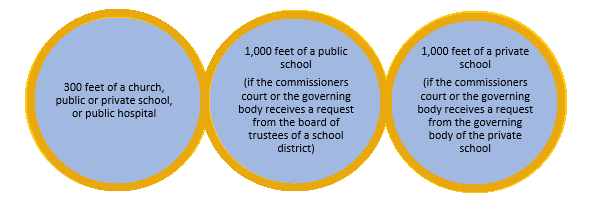ALCOHOL REGULATIONS
IN TEXAS (TABC)
The Texas Alcoholic Beverage Code is the guiding Texas law for the alcoholic beverage industry and applies to the manufacture, sale, distribution, transportation, and possession of alcoholic beverages.
TEXAS ALCOHOL LICENSE FACTS
Alcohol Regulation Facts
The Texas Alcoholic Beverage Code is made up of the guiding laws for the alcoholic beverage industry and passed by the Texas State Legislature.
"Alcoholic beverage" means alcohol, or any beverage containing more than one-half of one percent of alcohol by volume, which is capable of use for beverage purposes, either alone or when diluted.
Food And Beverage Certificates
Food sales must be the primary business being operated with facilities capable of making multiple entrees. Alcohol sales cannot exceed 50% of gross receipts. An establishment with a food and beverage certificate is exempt from the 300-foot spacing from private schools, daycare/childcare centers, and also exempt from municipal regulations of the location of private clubs.
However, Bring Your Own Beer (BYOB) establishments are not regulated nor are required to get a permit or license from the TABC. Municipalities also may not regulate the possession or consumption of any alcoholic beverages inside of an establishment that offers the BYOB option.
Local County Regulation of Alcohol
The commissioners court of a county may set regulations for areas in the county outside an incorporated city or town. The governing board of an incorporated city or town may set regulations applicable in a city or town.
The sale of alcoholic beverages by a dealer is prohibited if the place of business is:
Local County Regulation of Alcohol
The commissioners court of a county or governing board of a city or town has discretion to allow variances to the regulations if it is determined that the enforcement of a regulation is:
- Not in the best interest of the public;
- Is a waste or insufficient use of resources;
- Creates hardship on the applicant of the license or permit;
- Does not serve the intended purpose, is not necessary, or any other reason with consideration of the health, safety, and welfare if the public; and
- Overall, in the best interest of the community.
For more information on the Alcohol Permitting Process in Texas, and for determining if your county is wet or dry, see our Texas Alcohol Permitting Process web page. Our alcohol and licensing attorneys can assist in you applying for your alcohol permit.
TABC ATTORNEYS IN DALLAS
At
Wilson Whitaker Rynell Attorneys at Law, we specialize in navigating the complexities of alcohol licensing for businesses such as bars, restaurants, liquor stores, and other establishments that require a liquor license issued by the Texas Alcoholic Beverage Commission (TABC). It is crucial for business owners involved in the sale of alcohol to have proficient legal representation when dealing with the TABC. Our experienced TABC attorneys in Dallas are dedicated to guiding you from the initial stages of business planning through production and sale, ensuring a smooth licensing process.
Additional TABC Focus
Alcohol-Free School Zones
Prohibits the sale of alcohol within 1,000 feet of an alcohol-free school zone. Must be initiated by the public school district or board of a private school and created by city council resolution. Does not apply to restaurants, manufactures, wholesalers, or liquor stores where minors are prohibited from entering within 1,000 feet of a private school.
Violations Of The Alcoholic Beverage Code
- Will be fined no less than $100 but no more than $1000;
- Can be jailed for no more than one year; or
- Have both the fines and jail time applied.
- Provider was aware of the intoxicated state of the individual being served, sold, or provided an alcoholic beverage and it was obvious that the person presented a clear danger to himself and/or others;
- the intoxication of said person was the proximate cause of damages suffered; and
- an adult 21 or older is liable for damages caused by the intoxication of a minor if:
a. The adult is not the parent, guardian, or whose custody of the minor was given to by a court; and
b. the adult knowingly served or provided the minor with any alcoholic beverage or allowed the minor to be served beverages on the premises of the adult.
CLIENT MATTERS
5,000+
YEARS OF SERVICE
25+
Award Winning
Recognized in the legal industry as dedicated board-certified lawyers and Rising Stars.
Expert Team
Your project will be handled by legal experts every time. You will have the most experienced attorneys working for you.
Quality Representation












